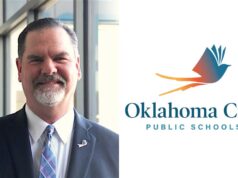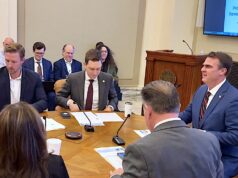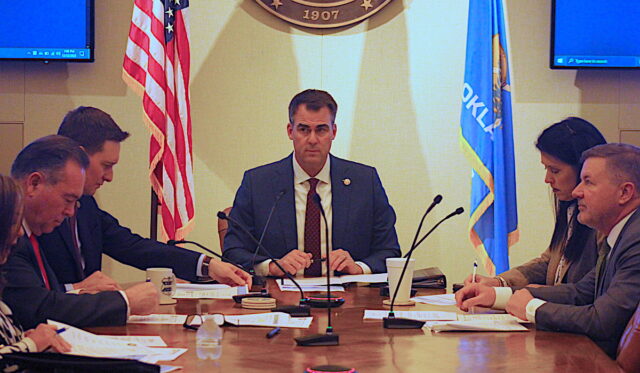

As 2023 draws to a close and we all prepare for an election year to begin, the powers that be seem to have decided this is the time for news to break.
While we’ve been trying to value a healthy work-life balance with some time off for the holidays, our reporters have still been monitoring a lot of tumultuous civic topics deserving of attention.
Below, please find some fruit from our holiday labors: An end-of-year roundup of various interesting developments in Oklahoma. Read on so you can impress your friends and be the most informed person at your New Year’s Eve party.
Follow @NonDocMedia on:
Facebook | X | Text or Email
Federal judge orders 84 wind turbines removed from Osage Nation
An 84-turbine wind farm must be removed from Osage County, following U.S. District Judge Jennifer Choe-Groves’ ruling in United States v. Osage Wind on Dec. 20 that the project improperly mined and used minerals from the Osage Nation mineral estate without a permit during construction.
Energy journalist Robert Bryce called the order to remove 84 wind turbines at once “unprecedented.”
“While the industry has dealt with scattered instances where a handful of wind turbines have been torn down due to opposition, such as the removal of two turbines last year in Falmouth, Massachusetts, it has never faced a loss of this magnitude,” Bryce wrote on his Substack.
The wind farm, operated by the Italian multinational company Enel, did not acquire mining permits before mining rock from the lease site for use in building the foundation for wind turbines. Under the Osage Tribe Allotment Act of 1906, the rights to subsurface oil, gas and other minerals are collectively owned by the Osage Nation and managed by the Osage Mineral Council.
“On the record before the court, it is clear that defendants are actively avoiding the leasing requirement. Permitting such behavior would create the prospect for future interference with the Osage Mineral Council’s authority,” wrote Choe-Groves, “The court concludes that defendants’ past and continued refusal to obtain a lease constitutes interference with the sovereignty of the Osage Nation and is sufficient to constitute irreparable injury.”
While the Osage Nation’s mineral estate is most famous for its oil rights and revenue, the estate also includes the rights to all minerals in the county, including rocks or aggregates mined for use in construction. Regarding the 84-turbine wind farm, the Osage Nation argued that Enel’s mining of rocks for use in turbine foundations and the continued use of those rocks as backfill constituted trespassing on its mineral estate, an argument with which the court agreed.
Although wind turbines are lauded for producing clean and renewable energy, their construction involves placing 300 cubic yards of concrete into the ground. Turbine foundations generally measure about nine-feet deep and about 60-feet in diameter, meaning the require 30 to 40 truckloads of concrete.
Enel’s lawyers argued that owing to the cost of removing wind turbines and the potential economic effects, the court should rule that the wind farm be allowed to remain. However, Choe-Groves made clear those interests would not “overshadow the public interest in preserving the Osage Nation’s tribal sovereignty.”
The ruling is the latest in a nearly decade long lawsuit. KOSU’s Allison Herrera reported that an appeal of the decision to the 10th Circuit Court of Appeals is unlikely, but a trial for the total amount of damages owed to the Osage Nation is still pending.
Enel, meanwhile, announced earlier this year that it plans to build a $1.8 billion solar power facility near Inola, a project that the Oklahoma Legislature has dedicated up to $180 million for if job-creation and investment metrics are met.
Legislature could have about $450 million more to appropriate
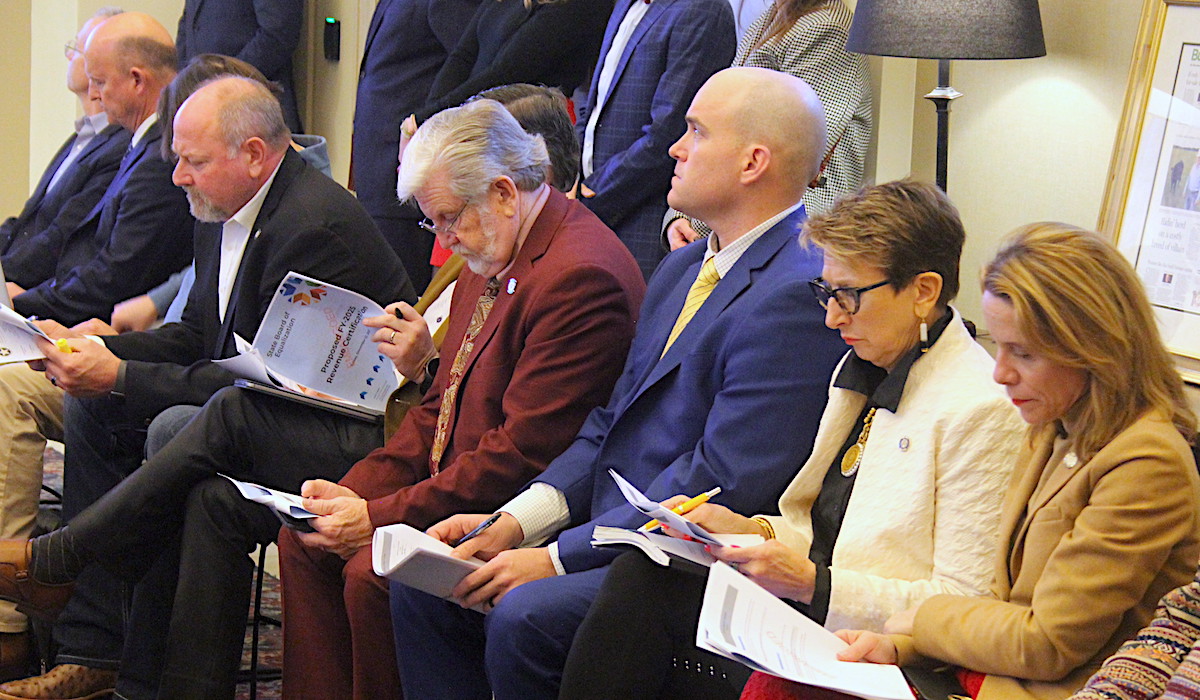
At the final Oklahoma Board of Equalization meeting of 2023, fiscal staff told statewide officials that early estimates indicate that the Legislature could have about $458 million of additional recurring revenue to work with when crafting the Fiscal Year 2025 state budget.
On Feb. 5, the Oklahoma Legislature will convene for its 2024 regular session to craft the FY 2025 budget. Ten days later on Feb. 15, the Board of Equalization will meet again to approve final fiscal estimates and expenditure authorization for lawmakers.
“It’s a good outlook. I’m looking forward to seeing February’s numbers,” said House Appropriations and Budget Chairman Kevin Wallace (R-Wellston). “It’s definitely a growing economy, nothing outrageous.”
Wallace said that, as always, legislative budget leaders will want to review recurring revenue projections and one-time funding requests once final expenditure authorization is granted by the board.
Barring major changes in the price oil or other projections, the increased budget estimate will likely fuel further negotiations over tax cut options that all three legs of the legislative stool — the House, Senate and governor’s office — say they want in one form or another.
“We didn’t really dive into it, but they’re going to want to talk about baselines and what one-time expenses were,” he said. “Tax cuts will be on the table this year. But until we get the February numbers — which I do expect them to change a little bit. The attorney general asked if they would guarantee that for February. The numbers will change between now and February. But the outlook is good.”
On Dec. 14, Oklahoma Gov. Kevin Stitt said he will continue to push for tax reductions during the 2024 session, which has already seen Senate and House leaders file bills related to eliminating the state portion of sales tax on groceries and reductions in the corporate and personal income tax rates.
“I’ve said it since 2019. I believe in smaller government (and) lower taxes, I would never suggest we cut taxes below where our expenses are. You know, we’ve got to block and tackle, and we’ve got to pay for certain things. But I’m also — when we have these huge budget surpluses — we can’t just try to figure out a way to spend more money, and that seems to be what happens,” Stitt said. “So when it comes to lower taxes, you know me — I think one of the most regressive taxes we have is the grocery tax. So I’m very proud if they want to get rid of the grocery tax. Families are hurting. I mean, when you go to the grocery store, it’s painful. Everything seems to be costing more money, so I’d love to get rid of that. I think a modest quarter of a point (personal income) tax cut is something that, as we have revenue increase, we certainly should do that. You know, I’m not being reckless here we have $5 billion in savings. I’m super conservative. But we need to give this back to the to the taxpayers at some point, because it’s not our money.”
Stitt wants universities to close DEI offices despite order language
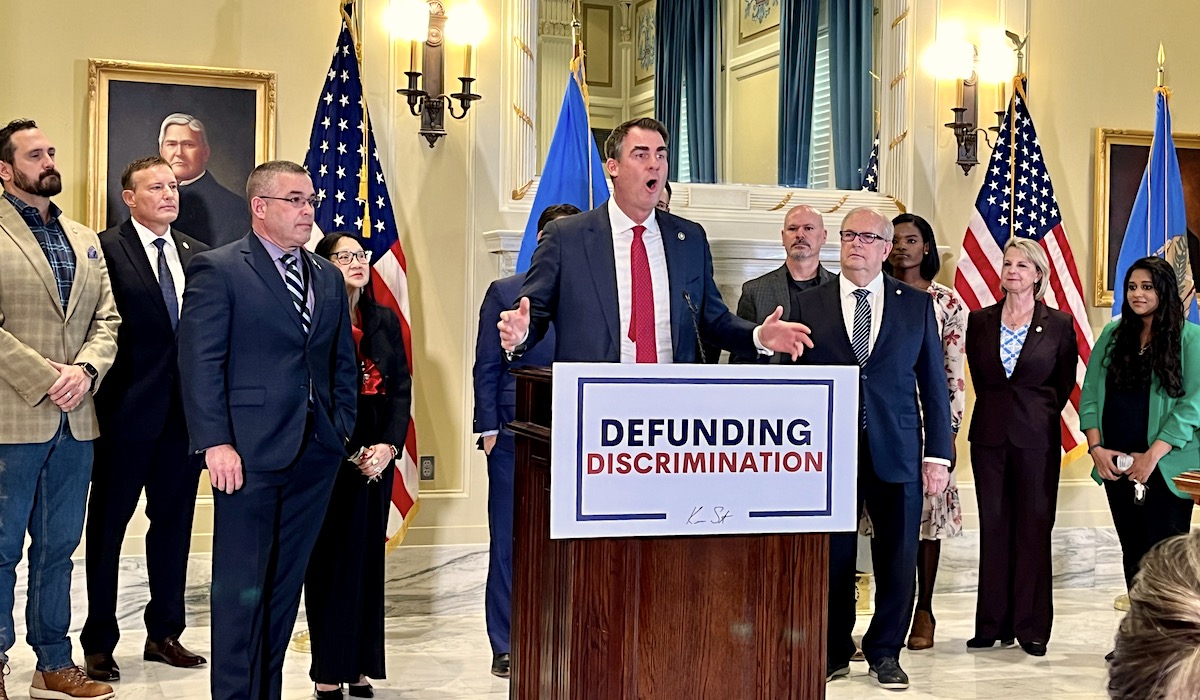
On Dec. 13, Gov. Kevin Stitt issued an executive order prohibiting state agencies from using state funds, property and resources for diversity, equity and inclusion programs “to the extent they grant preferential treatment based on one person’s particular race, color ethnicity or national origin over another’s.”
The state’s largest universities responded to the order with differing statements. Oklahoma State University leaders said that a review of their DEI program indicated no changes would be necessary after Stitt’s order.
“OSU faculty, staff and students are guided by the Cowboy Code, which invigorates us with a ‘passion to do what’s right,’ and united in the Cowboy culture, which demands that ‘we treat every individual with dignity and respect and recognize that differences can serve to strengthen and enrich the fabric of life,’ OSU President Kayse Shrum said in a statement. “Those fundamental commitments will not change.”
University of Oklahoma Joe Harroz, however, sent an email to students, faculty and staff stating that OU will be “eliminating” its diversity, equity and inclusion office owing to Stitt’s order. The university’s interpretation of the order’s requirements drew criticism from the ACLU, which said such programs have federal protection and called OU’s “leap” to eliminate its program “startling.”
“We implore Oklahoma universities not to jump to conclusions but instead read the EO carefully, understand its narrow scope, and continue to support their diversity, equity, and inclusion efforts,” ACLU of Oklahoma communications director Cassidy Fallik said in an email.
Stitt, however, told journalists after the Dec. 22 Board of Equalization meeting that he intended for universities to close their DEI offices and programs.
“They should eliminate their DEI offices. Admission should not be based on race,” Stitt said. “Basically that order — and that just follows that United States Supreme Court case that we want admissions based on merit. (…) The DEI offices should be eliminated. The amount of money they are spending on that — we don’t need to be talking about stuff that divides us.”
Asked about the clarifying clause in his order about DEI programs stating, “to the extent they grant preferential treatment,” Stitt said the focus of his executive order is about admissions.
“You can go down this rabbit hole, and you can come up with who is disadvantaged, right? But you have to eventually make it based on merit. And that’s what I’m saying. So if you rename it something else, as long as they’re not basing admissions on race, that’s really what we’re trying to get to as the heart of it,” Stitt said. “And so, I’m sure maybe they could wiggle out of something and rename it something else. That’s a big budget that they have at those universities. So I don’t know.”
Adding political irony to the situation, Stitt’s private company — Gateway Bank, which has been placed in the Stitt Family Trusts during his governorship — promotes DEI concepts on its about page under the heading, “Diversity and inclusion, it’s simply who we are.”
“At Gateway, we are committed to creating an inclusive environment where everyone feels welcomed and valued,” the section states. “We are passionate about building inclusive relationships, embracing both similarities and differences to establish a sense of belonging for everyone. Our core values guide how we interact with our customers, each other, and the communities we serve.”
Asked Dec. 13 whether he knew Gateway Bank was promoting DEI, Stitt furrowed his brow while reading the company’s about page.
“I don’t run my bank anymore, so we’ll have to talk to the board. I’m not on it, I have no idea what they’re doing,” Stitt said. “Again, if you have private capital and you have your own business, you can do what you want. But state dollars is something different.”
Longtime broadcaster, political consultant Don Hoover dies
Don Hoover, a longtime broadcast journalist-turned political consultant, died Wednesday. He was 74.
Born in Deer Creek and raised in Chandler, Hoover graduated from Central State University, which is now the University of Central Oklahoma. He worked for national radio outlets and KOSU as a broadcast journalist before taking a job in the Oklahoma State Senate.

“Don Hoover was a master of the political arts and a publicist of unusual creativity,” said former Senate President Pro Tempore Rodger Randle (D-Tulsa). “His professional talents were exceeded only by the ethical standards that guided his work. He was never motivated by meanness, and he never stooped to underhandedness. He was a model that newer generations should follow. And Don was fun to be around.”
Hoover eventually helped run campaigns for Brad Henry, Jari Askins and a variety of other Democratic candidates.
“Few people know this, but, way back when he was working with me on my State Senate campaigns, Don was the very first person who told me I should run for governor. At the time, I thought he was crazy,” Henry, Oklahoma’s 26th governor, wrote on Facebook. “Don had one of the greatest political minds of anyone I’ve ever known. He was a true professional who always did it the right way. I wish we had more like him.”
Askins offered similar praise after learning of Hoover’s passing.
“As a journalism and PR major myself, I considered him a really great strategist, and he had connections in all forms of media,” Askins said. “He handled responses in a way that sounded like me and were true to me. He worked very hard to do that. He was very loyal in his support.”
For more information about Hoover’s life, read M. Scott Carter’s coverage in The Oklahoman. KOSU has created the Don Hoover Memorial Fund to help journalism students financially.
Former Chelsea police chief faces criminal charges, interim police chief named
Chelsea, a town of about 2,000 people in Rogers County, has a new interim police chief after the former police chief, Shawn McKibbin, was fired and charged with two financial crimes. According to court filings, McKibbin was charged with one count of “false pretenses” and one count of using a computer for fraud on Dec. 22. He was fired and replaced by interim Police Chief Kristen Sutherland on Dec. 26.
KOTV-6 reported that the charges stem from McKibbin allegedly falsifying bank statements to show he had more than $400,000 in his bank account while trying to purchase real estate. But McKibbin allegedly never had more than $6,000 in his account.
McKibbin likely raised suspicion when he presented the falsified document inflating his net worth. Court records indicate he was sued twice in 2021 for failure to pay debts. At least one of those suits resulted in a request to garnish his wages from the Chelsea Police Department.
Sutherland was unanimously appointed as the interim police chief during a town board meeting Tuesday, Dec. 26. McKibbin’s termination leaves the Chelsea Police Department with only two full-time police officers and one part-time officer on staff.
Ryan Walters responds to McBride subpoena
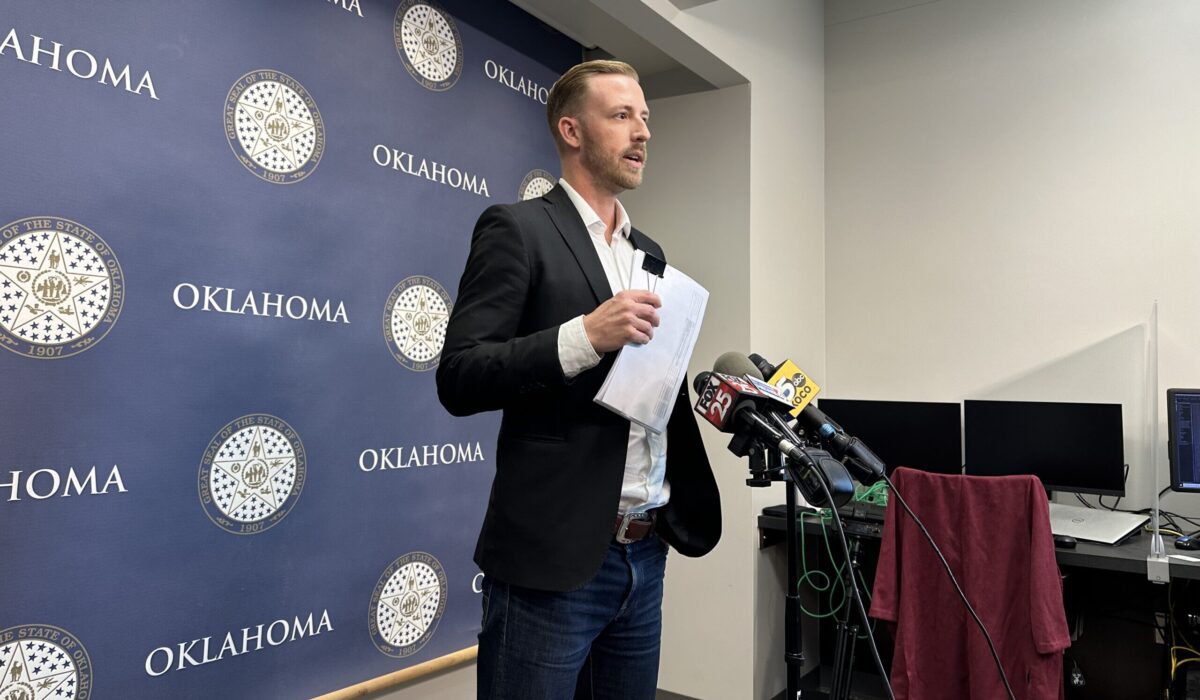
Rep. Mark McBride, who chairs the House Appropriations and Budget Education Subcommittee, said in a press release Tuesday that State Superintendent of Public Instruction Ryan Walters had complied with a subpoena filed before Christmas.
“I appreciate Superintendent Walters’ quick compliance with the subpoena, and I have begun reviewing the delivered documents to ensure that they contain all of the information that was requested,” McBride (R-Moore) said in a statement. “I exercised my power to subpoena the superintendent to produce these records, but I wish it would not have had to come to that. My focus has always been, and will continue to be, doing what is best for Oklahoma students.”
In a rare move, McBride issued the subpoena — also signed by House Speaker Charles McCall (R-Atoka) and House Common Education Chairwoman Rhonda Baker (R-Yukon) — on Dec. 19 compelling Walters to produce records McBride said he had been seeking for weeks. The requested records concerned statements Walters had made about his teacher recruitment program, failing school districts and other financial matters.
McBride had said Dec. 8 that Oklahoma State Department of Education chief political advisor Matt Langston responded to one of his requests for the information with the phrase: “Fool me once, shame on you. Fool me twice, shame on me.”
“It is my hope that moving forward, the extreme, but sometimes necessary, process of using a subpoena will not be needed, and the superintendent will more openly and willingly communicate with members of the Legislature,” McBride said in his Tuesday press release. “The legislative branch is constitutionally charged with oversight of the budgets of certain departments, including the OSDE. Additionally, our responsibility as elected officials is to work together for the betterment of our state, not continuously fight to earn political clout or obfuscate the process of government.”
Walters declined to address the matter specifically when asked after a State Board of Education meeting Dec. 21.
“I’ve talked to the speaker the last couple days — him and I have had several conversations and, look, we’re going to continue to work together to improve Oklahoma education,” Walters told reporters.
Langston had also declined to address the subpoena specifically, but he said in a statement the day the subpoena was issued that McBride had lied repeatedly about Walters and had worked with Democrats.
Walters and the education department had until Jan. 5 to produce the requested records.
“I will continue to review the subpoenaed documents with the hope that they fully answer the committee’s questions and give us a more complete understanding of the processes and procedures of the OSDE under Superintendent Walters’ leadership,” McBride said in his statement. “I thank him again for his swift compliance and hope for a less adversarial working relationship in the future.”
Work to start in early 2024 on OTA widening project
The new year should see construction getting underway on the first part of the Oklahoma Turnpike Authority’s $5 billion expansion plan that had been on hold for several months because of legal challenges.
Construction is expected to start in the early part of 2024 on widening and reconstructing the Turner Turnpike between Bristow and State Highway 66 near Heyburn, an unincorporated community west of Kellyville. During its meeting Dec. 12, the OTA awarded a $98.6 million contract to Duit Construction Co. to do the work from mile post 197.26 to mile post 203.07.
The six-mile widening project is the first construction contract awarded in OTA’s 15-year ACCESS Oklahoma program, which stands for or Advancing and Connecting Communities and Economies Safely Statewide. The Turner Turnpike, the state’s oldest turnpike, was widened from four to six lanes about four years ago between Tulsa and the Heyburn area as part of OTA’s Driving Forward program.
“This is our first step for ACCESS that is an extremely exciting one,” Oklahoma Transportation Secretary Tim Gatz, who also serves as OTA’s executive director, said during the meeting. “Again, getting that section down to Bristow widened to the full six-lane width is a really red-letter day for the Turnpike Authority. And we’ll have six more miles that will be far safer, prepared for the future.”
Similar to the earlier widening construction project, traffic will often remain open to two lanes in each direction, but motorists can expect significant lane shifts and possible night-time closures narrowing to one lane in each direction.
The ACCESS plan includes subsequent widening the 60-mile segment of the Turner Turnpike between Bristow and Interstate 35 at a cost of $1.11 billion, which will complete the widening of the entire turnpike between Tulsa and Oklahoma City.
Darian Butler, the agency’s engineering director, told OTA members the project will include a new State Highway 66 interchange at milepost 202.5 to mile post 204.6 for better access, including entrance and exit ramps for both eastbound and westbound lanes of the Turner Turnpike east of Bristow in Creek County.
Work on the ACCESS program had been delayed for about a year by legal challenges from residents concerned about plans to build new toll roads in Norman that threatened their homes. The Oklahoma Supreme Court ruled in August against their argument that much of the new south extension turnpike — which would run from Interstate 40 near Newalla south around Norman and into McClain County for the Interstate 35 connection just north of Purcell — was not among corridors approved by lawmakers in 1987. The high court also overturned a district court ruling that the OTA willfully violated the Open Meetings Act when the ACCESS Oklahoma plan was announced.
After the court rulings, the first bond funding for the ACCESS program was sold in October. It totaled $500 million.
Meanwhile, opponents to the ACCESS program said Wednesday they are continuing efforts to hold the OTA “accountable through our legal and legislative reform activities.” Members of Pike Off OTA and Oklahomans for Responsible Transportation have formed a new organization, the Foundation of Oklahomans for Responsible Transportation, aimed at allowing them to accept tax-deductible donations.
In Catholic charter school case, judge declines to remove himself
Lawyers in a lawsuit seeking to block the newly approved St. Isidore of Seville Catholic Virtual School met in Oklahoma County District Court on Dec. 21 for a hearing on the plaintiffs’ motion to disqualify the judge.
District Judge C. Brent Dishman said he would continue to preside over the case pending a request for a rehearing and then a possible formal appeal from the plaintiffs after the lawyers met with him privately, then publicly, to discuss his potential conflicts of interest.
One of the lawyers for the plaintiffs, Kenneth Upton, told NonDoc after the hearing that Dishman himself had alerted the lawyers to the potential conflicts, which exist on both sides of the case.
On the plaintiffs’ side, Dishman’s sister-in-law is a cofounder and member of the controlling body of the Oklahoma Parent Legislative Advocacy Coalition, which is the lead plaintiff of the case.
On the defendants’ side, Dishman is a member of the board of trustees of the College of the Ozarks. The private college recently retained The Alliance Defending Freedom — one of the firms representing the defendants — in a federal lawsuit asking the court to enjoin a Biden administration memo prohibiting colleges from discriminating against students in living spaces on the basis of gender identity or sexual orientation.
Upton said that the hearing’s outcome was a routine part of the process to disqualify a judge. He also told NonDoc that the lawyers had discussed the matter privately with Dishman before the hearing and that Dishman had said then that he did not feel the need to disqualify himself.
With Dishman’s denial, the plaintiffs now have the option to ask the chief judge of the court to review the matter. If that judge reaffirms Dishman’s decision, they will then be able to formally appeal the ruling to a higher court.
“I think that most judges don’t take it personally. I mean, there are times when you see the judge get a little bit of a temper, but I’ve only been in front of him a few times, and he seems pretty even-keeled — he doesn’t seem to be prone to taking things personally. So, I think the process is playing out right now like it should,” Upton said of Dishman. “Most likely, we’ll take it to the presiding judge to get a second opinion, and then after that, we’ll see.”
A group of 10 plaintiffs are using the lawsuit, which was filed in July, to try to stop the creation of what would be the nation’s first Catholic charter school. The Dec. 21 hearing was originally scheduled so the parties could argue on three separate motions to dismiss from the defendants. Those arguments were delayed so the court could first decide the disqualification question.
A hearing on the motions to dismiss has not been rescheduled yet.
Mistaken release of detainees at Oklahoma County Jail
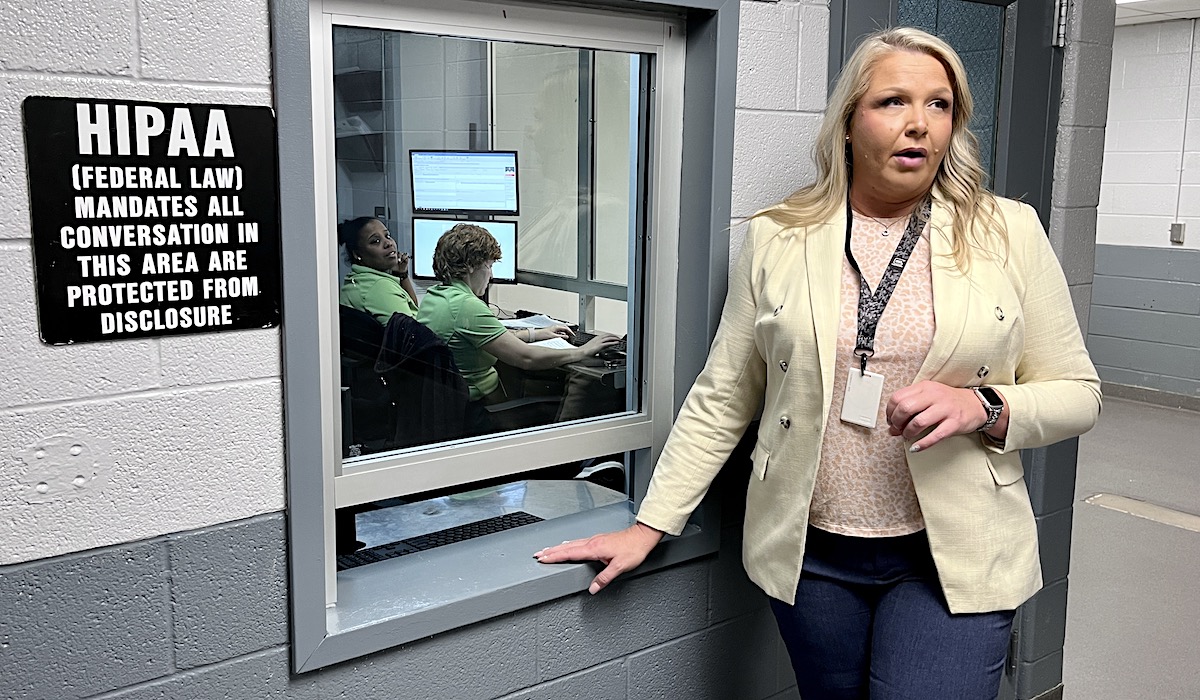
It’s been a bit of a rocky close to 2023 for staff of the long-beleaguered Oklahoma County Jail, with the mistaken release of two detainees earlier this month.
Devonne Sias was released from jail Dec. 4 by mistake after he had been booked on larceny and burglary complaints. Sias was re-arrested on Dec. 11 by police in Oklahoma City. Sias had been impersonating another detainee set to be released that day, but his identity was not adequately verified by jail staff, leading to the unintended release.
The incident with Sias was preceded by another mistaken release of a detainee Dec. 1 by jail staff. In that incident, Joshua Hardeman was released by mistake in what was called a clerical error by staff. The charges that landed Hardeman in jail had been dismissed, but he also had an outstanding warrant that was not noticed by staff until after he had been released. Hardeman was later re-arrested.
Oklahoma County Jail CEO Brandi Gardner said in a statement.
“We deeply regret the distress and inconvenience caused by these incidents. Our top priority is to rectify the mistakes, ensure the safe return of the mistakenly released individuals to our custody, and take concrete steps to prevent such errors in the future,” Garner said.
Mapping project looks at hottest areas of OKC

Cold weather is here for a couple of months, but the inferno otherwise known as an Oklahoma summer will be back before you know it. To that end, staff with the City of Oklahoma City spent part of the last summer compiling data for their Urban Heat Island Mapping Campaign. The city released those findings earlier this month.
Urban heat islands are areas of the city that offer very little or no shade and also include hard surfaces like concrete or asphalt. Those areas can be up to 7 degrees Fahrenheit hotter than other areas during the daytime and 5 degrees hotter at night.
Not surprisingly, downtown areas with loads of concrete and steel are often the hottest areas of cities like OKC. The heat-mapping campaign also included ideas on how to make your neck of the woods a little cooler even in the hottest of temperatures.
To read the full City of OKC Urban Heat Island Mapping Campaign, click here. An interactive map of the city’s hottest areas can be viewed here.












